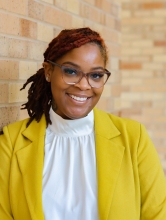
Symone A. McCollum (she/her/hers) is a third-year Ph.D. student in the Higher Education Administration Program at Texas A&M University. Before joining Texas A&M University, Symone received her Bachelor of Science in Education and Public Policy and a Master of Education in Higher Education from The Pennsylvania State University. Her research interests include the educational trajectories of Black women in higher education, policies and practices that impact Black women's educational trajectories, and Black women's use of social media/technology. Symone also maintains a broader research interest in graduate student retention and support at the intersections of multiple marginalized identities.
Symone’s dissertation research will examine how Black women doctoral students at historically white institution use digital communities while navigating their graduate programs. Through a digital Black feminism theoretical lens and endarkened storywork methodology, she will investigate the extent to which digital communities serve as counterspaces for Black women doctoral students, helping them persist and reach their academic and professional aspirations.

Kavitha Murthi is pursuing her doctoral studies in the Department of Occupational Therapy at NYU Steinhardt School of Culture, Education, and Human Development. She is collaborating with Counselor to the President, Dr. Kristie Patten, on a National Science Foundation (NSF) project titled “Developing Abilities and Knowledge for Careers in Design and Engineering for Students on the Autism Spectrum by Scaling Up Making Experiences.” Her research aims to investigate how interest-driven and strength-based engineering activities impact the learning and social development of autistic students. Kavitha is particularly interested in understanding how autistic adolescents interested in engineering and design engage in maker clubs to problem-solve independently using the Engineering Design Process (EDP). She is also dedicated to amplifying authentic autistic voices in her research by including her participants in the research process using a research process called Photovoice. Kavitha collaborated with her participants in different stages of the research process, namely developing socially valid research questions, data collection, and data analysis. She has also authored several peer-reviewed journal articles; most notably, she co-authored practice guidelines for occupational therapy practitioners working with autistic individuals. She also has presented at several national and international conferences.
Before beginning her doctoral studies at NYU, Kavitha obtained her post-professional graduate degree in Occupational Therapy from the United Kingdom and completed her undergraduate studies in Occupational Therapy at the Maharashtra University of Health Sciences in India. In the United Kingdom, she was inducted as a Fellow by the Higher Education Academy for her deep commitment to developing a culturally sensitive course for undergraduate occupational therapy students. She has extensive experience as a registered clinical pediatric occupational therapist in Mumbai and Edinburgh.
Kavitha has been invited to be a guest lecturer at NYU, Queen Margaret University (UK), and internationally. She is also invited to guest in several podcasts in her profession, like the OT Potential, Everyday Evidence by AOTA, and the OT Lifestyle movement. She also was interviewed to be a part of a documentary called ‘Finding Me in OT.’ The American Occupational Therapy Association has also invited her to be a reviewer on panels of award committees.
Additionally, she has contributed to various research projects, notably the Global Co-operation on Assistive Technology with the World Health Organization, for which she was nominated by the World Federation of Occupational Therapists in 2019. Kavitha is passionate about serving her professional community and has been invited as a project implementation manager in critical projects like the Occupational Therapy Narrative Database as an advisor to the American Occupational Therapy Association Evidence-Based Practice and Knowledge Translation group.
According to CDC reports, 1 in 36 children in the United States are diagnosed with autism (CDC Reports, 2023), and estimates indicate that approximately 200,000 autistic students will enter universities and the workforce in the next decade (Lubin & Brooks, 2021). Consequently, inclusive education programs are gaining increased attention to prepare the educational and vocational systems to carefully integrate these students (Bakker et al., 2019). Nevertheless, many such programs still focus on remediating these students’ deficits in communication, problem-solving, sensory needs, and behavioral differences using interventions that aim to normalize them to non-autistic levels (Kornblau & Robertson, 2020; Patten-Koenig, 2020). Challenges arise when differences in executive functioning and problem-solving mimic social and behavioral challenges and are unnoticed or unmet (Cramm et al., 2013).
Potent educational services that authentically include autistic students’ cognitive, sensory, and social differences are imperative to challenge conventionally dominant and ableist practices. To develop interventions that identify and develop these skills, the need to include autistic voices in educational research is imperative (Keating, 2021). Hence, this dissertation is developed to champion the voices of autistic middle schoolers who engage in independent problem-solving in informal educational contexts. This dissertation will attempt to shift the power dynamics toward the participants through authentic collaboration and include their perspectives at all stages in the decision-making process. By highlighting their strategies for independent problem-solving, this study will act as a starting point to develop educational interventions that value individual interests and build independent problem-solving to foster self-determination in these adolescents (Chapman, 2021).
Her dissertation will use the identity-first language "autistic individuals.” This non-ableist language describes their strengths and abilities and is a conscious decision. This language is favored by autistic communities and self-advocates and has been adopted by healthcare professionals and researchers (Bottema-Beutel et al., 2020; Kenny et al., 2016).
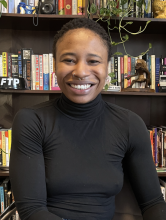
Iman Lathan is a former Division I women’s basketball player and a Southern California native. Currently, she is a Doctoral Candidate in Educational Culture, Policy, and Society within the Department of Educational Leadership and Policy at the University at Buffalo, SUNY. Her research revolves around exploring the commodification of Black women’s bodies, neoliberalism, NCAA, sports, and the Diaspora.
This qualitative case study aims to elucidate the internal mechanisms shaping the Division-I educational pathway and its role as a secondary diasporic conduit for Black female Division I basketball student-athletes. In so doing, I aim to unravel how the neoliberal intercollegiate sports model engages, exploits, and disposes individuals descended from the African Diaspora to sustain its operations. The research delves into the National Collegiate Athletic Association (NCAA) as a neoliberal structure, akin to a secondary diasporic vessel, directing Black female student-athletes—descendants of the Black Atlantic Diaspora—to predominantly white institutions (PWIs). Employing Black feminist thought (BFT) and a queer diasporic lens, this study seeks to comprehend how Black female ball players, coaches, and parents perceive their roles, positions, and experiences within the confines of the NCAA's neoliberal structures.
Moreover, BFT and a queer and diasporic framework inform the research design and data interpretation of this study as this project seeks to contribute to a nuanced understanding of how the NCAA's systems and capitalist structures perceive, treat, and utilize Black female athletes. The scarcity of work on the intersection of femininity, Blackness, and sport within the realm of a male-dominated sport like basketball necessitates a fresh perspective. The application of a queer diasporic lens becomes paramount in unveiling aspects concealed within dominant epistemologies.
Sharon Lai-LaGrotteria is an international scholar from Hong Kong and Singapore. She began her academic journey at the University of Hong Kong as a Jockey Club Scholar, earning her Bachelor’s in English with First Class Honors and Master’s in Education with Distinction, then continued to complete her Graduate Degree in Applied Linguistics at the University of Oxford.
Prior to joining Montclair State University as a Doctoral Fellow, Sharon served as an adjunct professor at the Jack Welch School of Business at Sacred Heart University, while concurrently holding writing seminars for first-year immigrant students at Monroe College in New York. An educator at heart, Sharon has taught at a wide range of schools, from preschool to higher education, both private and public, spanning from Australia, Hong Kong, and Singapore, to Connecticut, New York, and New Jersey. She also served as the Chief Education Director of Young Writers, a learning cooperative center established in 1997 with the mission of serving English learners in Southeast Asia. As a first-gen college graduate with humble upbringing, Sharon is a huge advocate for Asian and Asian American communities. She is a volunteer teacher at the Chinese Community Center, where she teaches Cantonese to heritage speakers and organizes community events for Chinese families across New Jersey.
During the early stage of her research career, Sharon focused heavily on inclusive education, English language education, and culturally relevant pedagogy, where she conducted qualitative studies on the implementation of inclusive education in kindergartens, language teacher identity, and the use of drama as an example of culturally relevant pedagogy for English learners. Her work was published in various journals, including Action in Teacher Education, Journal of Religion and Health, and Journal of Loss and Trauma. She has presented at local and international conferences, including the AERA Annual Meetings over the last three years, and Redesigning Pedagogy Conference at the National Institute of Education in Singapore. As she continues to witness the troubling escalation of deadly violence against Asian communities across the country, Sharon’s research interests became more centered on policy perspectives and curriculum implementation concerning Asian Americans and Pacific Islanders (AAPI).
Sharon’s dissertation research grew out of her experiences witnessing the troubling escalation of deadly violence against AAPI individuals in New York City during the pandemic. In pursuing meaningful ways of creating change for AAPI students in US schools, she extensively reviewed literature on AAPI history, spoke with district and school administrators, and collaborated with various advocacy groups to gather in-depth ethnographic data regarding the implementation of AAPI-inclusive curriculum across New Jersey. Given different state policies pertaining to the teaching of AAPI history across many parts of the States, this study will provide timely and novel insights related to how teachers enact this curriculum in K-12 classrooms. Engaging quantitative and qualitative methods, this study aims to explore broader trends across the state through the use of a teacher survey and case studies of individual teachers’ implementation. Beyond documenting the need for culturally responsive approaches, this study hopes to offer insights into the constraints and possibilities different stakeholders (teachers, school administrators, and policymakers) encounter when enacting curricular changes and implementing state mandates.
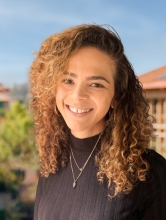
Kia Turner is pursuing a PhD in race, inequality, and language in education at Stanford Graduate School of Education. She graduated cum laude from Harvard University with a degree in history and literature in 2016 and from the Harvard Graduate School of Education in 2017. She is also pursuing her JD at Yale Law School. Kia taught middle school English in Harlem for five years, where she instituted a culturally relevant "Tools for Liberation" advisory curriculum. Kia is a recipient of the National Council of English Teacher's Early Career Educator of Color Leadership Award, Teaching Tolerance's Award for Excellence in Teaching, and the Fulbright-Hays Fellowship. She is currently a Knight Hennessy Fellow, a Ford Foundation Pre-Doctoral Fellow, and a Stanford Enhancing Diversity in Graduate Education Fellow.
Kia’s research seeks to understand how we might operationalize abolitionist theory and Black creative practices in educational and legal research and practice to (re)imagine speculative and liberatory educational and criminal legal systems. Kia works directly with youth, community organizers, movement lawyers, and teachers to build research-practice communities founded on long-term relationality. She specifically aims to uplift Black and other minoritized youth as scholars by co-authoring with the community members she works with. Her work pulls methodologically from different disciplines, as she uses archival, participatory, poetic, and more traditional social scientific methods to syncretically make knowledge outside of epistemic domination.
Kia’s dissertation focuses on the long durée of artistic creation in abolitionist practice and theory. It does so through a historically grounded research intervention, inviting Black youth to use Black poetics and abolitionist theory to artistically reimagine legal decisions that have perpetuated carceral practices in and beyond educational systems. Ultimately, her dissertation aims to 1) deepen our understanding of the ancestral and contemporary role of the arts in abolitionist practice, 2) position Black youth as legal knowledge creators, and 3) introduce a framework for the dovetailing of artistic, participatory, and social science methods in studies that aim to build abolitionist futures.

Briana A. Savage is currently a Ph.D. student in the Higher Education Administration and Policy program at the University of California, Riverside. She serves as a Research Associate at the UCR Center for Athletes' Rights and Equity (CARE), as well as a Project MALES graduate scholar.
Briana received her M.Ed. from the USC Rossier School of Education, and her B.A. in Political Science with a double minor in Education and Public Policy from the University of California, Los Angeles.
As a former college athletics practitioner, she combines theory with practice and is involved in multiple projects centered on Black college athlete experiences on higher education campuses. Briana focuses on exposing how racism, sexism, and antiblackness are present within higher education and NCAA policies and practices in order to create equitable environments for diverse student athlete populations. Her dissertation research, tentatively titled “Imagining Life After Sport: Black Women College Athletes’ Postgraduate Career Transitions”, will use antiblackness and intersectionality theory to examine how racialized and gendered experiences of D-I Black women college athletes, during their undergraduate years, influence their postgraduate career transitions.
Outside of her dissertation, she is involved in a co-authored, multi-paper project focused on Black Student Athlete Organizations on PWI campuses serving as counterspaces and places of healing for Black college athletes. Additionally, as a Research Associate for UCR CARE, Briana is involved in projects centered on Black athlete development and experiences during college (e.g. sources of support, engagement activities, and mentorship). Her most recent co-authored publication highlights the lack of career preparation beyond sports, hyperfocus on eligibility requirements over academics, and the microaggressions and racism evident within college athletics departments across the D-I level, specific to Black athletes.

Maricela Bañuelos is the proud daughter of Mexican immigrants who valued education but were only able to obtain third-grade level educations. Maricela’s mother was her first teacher, she taught her to read and write in Spanish when she was four and her father often encouraged her and her siblings to pursue higher education so that they could have better paid and less arduous jobs. Maricela Bañuelos received her Sociology B.A. from the University of California, (UC) Santa Barbara in 2016, and graduated with Summa Cum Laude, highest honors. When Maricela started college, she took sociology of education and sociology of inequality courses that allowed her to understand the inequities she observed in educational institutions and how structural oppression limited the opportunities of the communities she comes from. This led her to pursue roles where she could support the higher education pathways of underrepresented students of color. For example, she served as an officer for La Escuelita [The Little School], a non-profit that supported the higher education pathways of low-income students of color by providing college scholarships, organizing a Student-Parent Conference at UC Santa Barbara, and offering free tutoring for students in K-12. She also worked for the Educational Opportunity Program, where she served as the Chicanx Latinx Resource Center mentor and created and facilitated programming to support the experiences of first-generation and low-income students of color. After graduating, she worked for City Year Los Angeles, and worked in an after-school program at a high school serving predominantly low-income Latinx students. She received her master’s in Educational Policy and Social Context from UC Irvine in 2020 and is currently pursuing her Ph.D. in Sociology at UC Irvine with an emphasis in Chicano Latino studies. Maricela was awarded the Ford Pre-Doctoral Fellowship in 2021, to support her doctoral research on issues of access and persistence in higher education. She is particularly interested in the educational pathways and social mobility of first-generation college students, low-income students, and underrepresented students of color.
Maricela’s research examines the role of race, class, gender, and intersectionality in shaping educational and occupational experiences. Maricela recently published a co-authored article titled “Gendered Deference: Perceptions of Authority and Competence Among Latina/o Physicians in Medical Institutions” in the top ranked journal Gender & Society. Our study found that gendered demonstrations of deference manifested through 1) gendered cultural taxation; 2) microaggressions from women nurses and staff and; 3) the questioning of authority and competence. These findings highlight the importance of gendered deference in transforming medical schools and medical workplaces into more inclusive environments. Through this project, her research interests have extended into examining the role of peoples’ social location in shaping not only their educational trajectories but also shaping their occupational experiences.
Maricela’s research has also focused on the doctoral pipeline and improving accessibility and retention of underrepresented students. One of her studies focuses on understanding the forms of support and barriers first-generation Latine college students experience on their pathways towards enrolling in doctoral programs. She conducted 25 semi-structured interviews with first-generation Latine students who successfully enrolled in doctoral programs in California. She co-authored a paper examining professors’ influence in first-generation Latine college students’ pathways into doctoral programs, which has now been published in the journal of Race Ethnicity and Education.
Her dissertation builds on this research by employing a longitudinal qualitative methodology spanning across three years (2021- 2024), that interrogates the experiences of 45 Latine participants who either 1) applied and enrolled into Ph.D. programs or 2) applied and but did not enroll in a Ph.D. program. In one chapter, she compares the social capital of Latines who got accepted into Ph.D. programs to that of Latines who did not get admitted or declined admission and the impact that COVID-19 had on their doctoral application processes. In another chapter, she examines how resources and social support affect whether Latines decide to reapply to Ph.D. programs, and how Latines navigate the doctoral reapplication processes. In a third chapter, she interrogates how information and networks at the time of application affect students’ acclimation and satisfaction in their Ph.D. program in the first two years and seeks to understand the long-term impact of applying and enrolling in Ph.D. programs after the onset of COVID-19. While sociologist broadly understand the inequitable processes that shape Latine Ph.D. trajectories, her dissertation will meaningfully contribute to the field by examining these processes longitudinally across multiple junctures, underscoring the impact of COVID-19, and including Latine with stifled and nonlinear Ph.D. pathways, whose experiences are important to fully understanding the seals and leaks in the Latine Ph.D. pipeline.
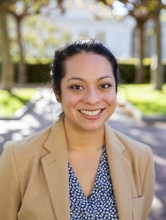
Karen Villegas is a doctoral candidate in the Berkeley School of Education at UC Berkeley. She received her B.A. in Political Science from UCLA. Karen’s overarching work explores issues of language, citizenship, and nation-building processes.
Karen’s dissertation is a study of the ideological conceptions of language and literacy practices in adult, English as a Second Language (ESL) citizenship classes. Adults enroll in these classes to prepare for the naturalization process; a means of acquiring U.S. citizenship available to lawful permanent residents after meeting extensive federal requirements. Using a range of methods, including interviews, participant observation, and archival research, Karen’s work shows how these learning spaces do not foster a sense of political incorporation or belonging, and instead position U.S. immigrants to identify as workers rather than citizens who can influence their world.
Although Karen’s dissertation identified ESL citizenship classes as indoctrinating spaces, their future work will examine the political possibilities of such spaces. While thinking beyond liberal notions of justice. Karen plans to observe, possibly even design, a community-based, Spanish-speaking ESL citizenship classroom, centering a pedagogical approach that explicitly privileges concientización by fostering critical consciousness among learners toward counter-hegemonic understandings of belonging, learning, and citizenship.

Khrysta A. Evans is a Ph.D. candidate at the University of Wisconsin-Madison in the Educational Policy Studies program with a Social Sciences concentration and a minor in Gender and Women's Studies. She is born and raised in the Bronx, NY and earned her BA in sociology from the University of Maryland, and her MA in educational studies from the University of Michigan. Before coming back to the academy for her Ph.D., Khrysta spent several years working in student support roles in schools and non-profit organizations. As a scholar, Khrysta is excited to learn about Black girls’ knowledge production and placemaking within schools. Situated in sociology of education, Black studies, gender and women’s studies, and cultural geography, Khrysta's teaching, research, and mentoring are all concerned with how race, ethnicity, gender, and place shape students’ educational experiences, with specific attention to how Black girls develop and employ spatial strategies and social networks to navigate their schools.
Using Black feminist geographies to animate her scholarship, Khrysta’s research (1) attends to the influence of ethnicity in Black girls racialized and gendered socialization within schools; (2) interrogates the role of peer groups in Black girls’ schooling; and (3) explores how the relationship between Black girls’ spatial strategies and their schools’ organizational routines differs across organizational contexts. In her current study, a 10-month multi-site ethnography at two New York City public high schools, she centers the experiences of Black West Indian girls. Khrysta uses social network analysis, walking interviews, and education journey mapping to understand how Black girls negotiate their own understanding of their schools and peer networks. Complemented by document analysis and interviews with school staff, this research seeks to understand the policies and actors shaping these girls’ school landscape. Her study positions Black girls’ articulations of their lived experiences as critical insight for education stakeholders seeking to improve the inequitable racialized and gendered school experiences of marginalized youth.
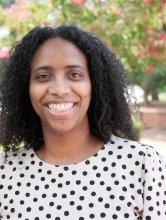
Stephanie Bent is a Ph.D. candidate in the Higher Education, Student Affairs, and International Education Policy program with a concentration in Student Affairs at the University of Maryland. At the University of Maryland, she is also a student in the Latin American and Caribbean Studies graduate certificate program. She holds a Master of Education in Anthropology and Education from Teachers College-Columbia University, a Master of Science in Higher Education-Student Affairs from Florida State University, and an Bachelor of Science in Applied Mathematics for Georgia Tech. From her experience working in residence life, living-learning communities, and academic advising at various institutions, Stephanie understands the challenges student affairs practitioners face in using theory in their practice. Stephanie sees her practitioner experience as an asset for producing scholarship which student affairs practitioners can use for translating theory to practice.
Stephanie migrated from Jamaica to the United States during high school. She proudly embraces her Jamaican culture in all aspects of her life. She attributes her love for education to one of the proverbs she recited in school in Jamaica: “Silver and gold will vanish away, but a good education will never decay.” Stephanie uses research to quench her curiosity for learning and hopes her teaching inspires students to be curious learners.
During her time at Teachers College, Stephanie learned about the power of the Caribbean-American identity in Brooklyn, NY. Stephanie identifies as Caribbean American and advocates for alliances among Caribbean people. She is committed to using her research and teaching to advance liberation for Caribbean peoples. Stephanie received a Fulbright student award to complete her dissertation fieldwork in Barbados, where she is exploring how to teach youth (18-25 year old) about decolonization.
Stephanie is an avid track and field fan. During the Olympics and the World Athletics Championships, you will find her watching a phone or tv screen cheering for a Jamaican or a Caribbean athlete. Stephanie finds inspiration in the lives of the Jamaican Women track athletes, especially Shelly-Ann Fraser Pryce. Stephanie enjoys spending time with her nieces, who boldly hold Stephanie accountable for resting by inviting her to virtually join the play activity of the day.
Stephanie Bent's research focuses on decolonizing higher education and teaching about decolonization in the Caribbean and among the Caribbean diaspora in the United States. She draws on theories and methods from Caribbean Studies, U.S. Black Feminism, and digital humanities to identify practical ways to decolonize research methods. As a decolonization scholar, she also disrupts the colonial flow of knowledge from the Global North to the Global South by positioning the Caribbean as a source of knowledge in her push against how U.S. higher education and student affairs enacts coloniality.
Stephanie explores how Caribbean youth and higher education students understand and enact decolonization. Her dissertation research is about how Barbadian youth aged 18-25 years understand decolonization. The Barbados government provides public education about decolonization through policy and programming, and Stephanie's research will provide insight into how youth respond to public discourse about decolonization. As research about Caribbean students' critical consciousness is limited, her dissertation research will undoubtedly raise questions for future research about how to engage college students in decolonizing the Caribbean.
Stephanie also explores how Caribbean-American students develop a positive view of their ethnic identity. With limited research on the ethnic differences among Black students, Caribbean-American students' experiences are rendered invisible. When Black Caribbean college students in the United States want to explore their history and culture, student affairs theories direct practitioners to guide students toward exploring African American history. Stephanie’s research pushes back on this neo-colonial practice, which elevates the United States as the center of global history and culture. In her research, she aims to understand how Caribbean students currently use and could potentially use Caribbean culture to respond to racism in the United States.
Stephanie’s research also explores how embracing Caribbean culture can create effective educational practices for Caribbean higher education. She explores existing student affairs practice in the Caribbean and uses Caribbean Studies theories to theorize about culturally appropriate Caribbean student affairs practices.
Stephanie uses her research to push against the dominance of Western epistemologies and ontologies in student affairs practice and research. She uses U.S. Black Feminism and Caribbean Studies to form alternative methodologies. She hopes her scholarship provides pathways for others to develop their Caribbean-flavored student affairs scholarship and practice.
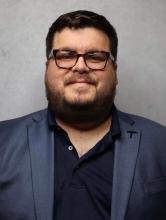
Nicolas Daniel Silva, LMSW, MS, "Nico" is a Society for Neuroscience "NSP" Scholar, social worker, artist, scientist, musician, curator, theatre maker, performance studies researcher, writer, and consultant.
He holds a BS in Microbiology with a concentration in Neuroscience, a Master of Social Work, a Master of Biological Sciences and Women's and Gender Studies and is a PhD student in Interdisciplinary Health Sciences at the University of Texas at El Paso (UTEP) investigating the use of music and sound as health behaviors, indicators, and neurotechnological interventions. He has lectured on performance studies theories, texts, and realities in the Department of Theatre and Dance with Dr. Melissa Melpignano, the Director of Dance. The first iteration of the course culminated in a multidisciplinary performance installation, MAPPING THE RIO which was part of World Water Week UTEP.
He has been invited to the NYU Hemispheric Institute for Performance and Politics Global Convening where he was part of the "Thinking Beyond the Human" Working Group. Last Summer, he presented on the Border Bioentrepeneurship Ecosystem at the NYU/Imperial College London Racial Equity in Technology Entrepreneurship Workshop. He published an article titled "Ultraendurance Sports: A Call to Action" in the peer reviewed Sport Social Work Journal. He also reviews for the Journal as an advanced social work and ultraendurance performance practitioner and researcher. He is a contributor to the Houston-based online arts magazine Glasstire and is a supporter, entrepreneur, and advocate of the Paso Del Norte region. Most recently, he was awarded a BIPOC Point Foundation scholarship and is part of the sixth cohort of the Global Arts in Medicine Fellowship.
He has attended and was awarded a Full Scholarship to the University of Florida Arts in Health Intensive 2023. He also was awarded a 50% Professional Scholarship to the 2024 Arts in Health Research Intensive with the Social Biobehavioural Research Group at the University College London. He currently serves as a Ph.D. Research Associate under the mentorship of Dr. Eva Moya Ph.D., LMSW and has engaged in focused study on the impacts and realities of sensorineural hearing loss with his Dissertation Committee Chair, Dr. Jason Mallonee, DSW, LCSW-S. Nico's research and practice spans many disciplines and intersections including performance, social work, arts in health, medicine, and society, mental health, disability, gender studies, queer studies, and basic needs security.
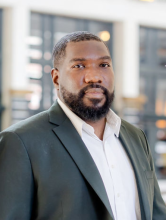
Blayne D. Stone, Jr. is a PhD candidate in the Educational Leadership and Policy Analysis program in the School of Education at the University of Wisconsin-Madison, with a focus in Higher Education and a minor in Counseling Psychology. As an Army soldier's son, Blayne has lived in multiple states and abroad. He earned an M.A. in Human Development Psychology from Cornell University, and a M.Ed. in Higher Education and B.A. in Liberal Arts, both from Florida International University. Before starting his Ph.D., Blayne has worked in student affairs positions and within support placement positions for youth and adolescents in need. He has worked on the Career Readiness portfolio team as a summer intern for the Education Strategy Group (ESG) in 2023, focusing on projects related to social capital development and middle school career exploration. Currently, he serves as a Research Associate in Wisconsin’s Equity and Inclusion Laboratory where he designs, conducts, and disseminates research that informs policymakers, practitioners, and concerned citizens on how to best promote equitable and inclusive learning and work environments in higher education.
Blayne's research interest focuses on advocating for educational equity and justice for Black college students with foster care experiences. His research explores the ways Black youth transition from foster care and through higher education institutions. He utilizes qualitative methodological approaches to heighten the awareness of the educational stories of students who have experienced time in the foster care system. Through his work, he examines the systems (e.g., foster care, child welfare, higher education) that continue to harm Black and brown bodies and explores strategies to improve their experiences. His dissertation explores the college-going process of Black students who were formerly in foster care. More specifically, his dissertation research examines how and why Black students formerly in foster care selected a specific institution and academic major.
Jennifer Lopez is a first-generation Mexican-American who strives for social justice and equity every day from her elementary classroom in Sylmar, California. With over 12 years of teaching experience in both elementary and middle school, Jennifer has also served as a grade level lead, a girls’ soccer coach, a student council facilitator, and mentor teacher. Outside of her educator responsibilities, Jennifer is actively involved in Educators for Excellence (E4E). Jennifer was a member of E4E’s Los Angeles Teacher Policy Team that wrote “One School of Thought: Moving Towards the Common Core” in 2015. Currently, she is on the Executive Committee of E4E’s National Teacher Leader Council, helping plan, facilitate, and guide the work for this group. As a lifelong learner, Jennifer is currently completing her doctorate in Educational Leadership at the University of Southern California, in the concentration of Leading Instructional Change. She previously received her B.A. from University of California, Los Angeles and M.A.T from Duke University. In her free time, you can find her hiking at national parks, watching soccer, or traveling the world.
Her qualitative action research focused on how to best support her colleagues' capacity in creating more meaningful learning opportunities in math. In order to accomplish this, Jennifer facilitated weekly professional learning sessions for classified staff (i.e., teaching assistants and/or after-school coaches) to support Latinx students with math during the after-school program. Utilizing adaptive leadership, critical reflection, and the andragogical moves of modeling, cognitive structures, and discourse, Jennifer sought to create transformative learning moments for her colleagues as they lesson plan. The findings for this study can help inform educators, administrators, and after-school programming on how to create the conditions and structures to promote more meaningful learning opportunities for students.
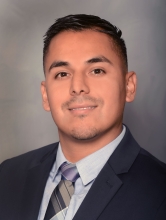
Jesse Enriquez is a Ph.D. Candidate in the Department of Education Studies at the University of California, San Diego. He is a proud product of two Hispanic Serving Institutions; he earned his B.A. in Kinesiology from CSU, Chico, and M.A. in Postsecondary Educational Leadership from San Diego State University. Prior to starting his doctoral studies, he worked in the non-profit sector and in higher education as a student affairs professional. He currently serves as the Associate Director of the CSU Young Men of Color Consortium and as an adjunct faculty member at California State University, Channel Islands, which is located a short distance from his hometown of Oxnard, California.
Jesse’s research explores the lived experiences of Students of Color who begin their postsecondary education at “two-year” open access institutions (i.e., community colleges) with hopes of transferring to a “four-year” universities to complete a bachelor’s degree.
His research unapologetically uplifts the voices of students on the margins, particularly young men of color, student-parents, and community college students. To examine the transfer phenomenon, he employs critical frameworks such as the transfer receptive culture framework (Jain et al., 2010) that analyze how institutions of higher education facilitate the transfer pathway for students who have been historically underrepresented and excluded from higher education. Rather than focusing on what Students of Color can do to improve, change, or learn to adapt to their environments; his research examines what institutions of higher education can do to improve, how they can change, and how they adapt to their students.
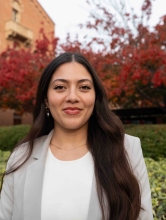
Patricia Martín is a Ph.D. candidate in the School of Education & Information Studies in the Division of Higher Education at UCLA. She was born in San Juan de Los Lagos, Jalisco, and raised in the San Joaquin Valley of California. Her experiences navigating higher education as a first-generation student and inequities in her P-20 schooling informed her research interests in studying higher education enrollment management, college recruiting, advertising, and college access. She received her bachelor’s degree in sociology with minors in education and applied psychology from UC Santa Barbara and a master's degree in higher education from UCLA. Patricia serves as a graduate researcher for UCLA’s DataX initiative in the curriculum development and redesigning of undergraduate and graduate courses at the intersection of data, ethics, and society.
Her research interests focus on the intersection of college access and organizational behavior. She is interested in using computational social science to investigate postsecondary institutions' enrollment and advertising practices and their effects on college access for underserved students. Her dissertation research tackles understanding universities’ digital marketing approaches as a timely and critical way to inform equity in college admissions. She employs a 12-month critical ethnography informed by Chicana/Latina Feminist epistemologies with high school students from California’s San Joaquin Valley (SJV). She utilizes semi-structured interviews, participant observations, collection of digital advertisements (e.g., emails and social media ads), and focus group interviews to explore the role digital advertising practices play in informing students’ college search and college application behaviors. Through a critical discourse analysis, findings from her dissertation shed light on the overwhelming information students receive through generic messaging and promotion of out-of-state, short-term, non-degree programs, and private institutions– perpetuating the inaccessibility of college.
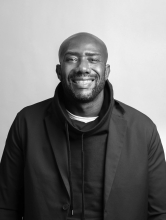
Dr. Ray Ankrum Sr. exemplifies visionary leadership in education. As the superintendent of a prominent urban charter school district in New York, he's relentlessly pursued academic excellence and nurtured potential within underserved communities. His commitment has yielded tangible results: his district is the top-performing unionized charter school in student proficiency rates for ELA/Math (2022-2023).
Dr. Ankrum's impact extends beyond academics. The district's third consecutive 5-year Charter Renewal, the maximum duration allowed in New York, signifies the exceptional quality of education provided under his leadership. This tenure has witnessed the district's expansion from K-8 to K-12, culminating in the momentous graduation of its first senior class in 2024.
Dr. Ankrum's passion goes beyond administrative success. He vehemently advocates for inclusivity, particularly for Black male leadership in education. Recognizing their profound influence on student outcomes and community engagement, Dr. Ankrum has become a key figure in shaping policies that empower and support these leaders.
His research agenda, grounded in his dissertation titled "BLACK MALE PRINCIPALS’ ENGAGING BLACK PARENTS IN URBAN CHARTER SCHOOLS: AN INTERVIEW STUDY” (defended at Manhattanville University, December 2023), tackles the dynamic role of school leaders in urban charter schools. His research centers on several key objectives:
- Understanding the Lived Experiences of Black Male School Leaders: Using qualitative methods, Dr. Ankrum delves into Black male school leaders’ unique challenges and triumphs.
- Black Parent Engagement in Urban Charter Schools: He examines Black parent engagement through the lens of Epstein's six types of parent involvement and assesses their contributions.
- Impact of Black Male Leadership on Parent Engagement: Dr. Ankrum investigates the specific influence Black male leadership has on parent engagement, aiming to inform interventions that strengthen this vital relationship.
- Black Male Care (BMC) Framework: He employs Bass's BMC framework to analyze Black male school leaders’ caregiving practices, emotional labor, and relational dynamics.
- Barriers and Facilitators to Black Male Leadership: This research arm identifies roadblocks and supports for Black male leadership in urban charter schools, aiming to improve recruitment, retention, and professional development strategies.
Dr. Ankrum's dedication to amplifying Black male school leaders' voices, untangling the complexities of parent engagement, and informing practices that empower educators and parents in urban charter schools is unwavering. His vision is to create more equitable and prosperous educational environments for all stakeholders.
As Dr. Ankrum continues to lead with distinction and inspire change, the educational community eagerly awaits his further contributions in pursuing an inclusive and high-quality education for every student.
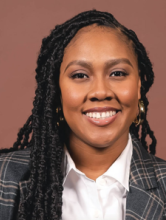
Nicole Dickerson is in the final stages of her Ph.D. program in Psychology, specializing in Brain, Behavior, and Quantitative Science at the University of Kansas. A NYC native, she pursued her undergraduate studies in Communication and Sciences Disorders at the University of Central Florida, followed by a Master’s in Speech Pathology at Howard University. Nicole then worked as a certified medical-based speech-language pathologist for two years before obtaining a second Master's degree in Cognitive Science from Johns Hopkins University. Her academic journey continued at the University of Kansas Medical Center, where she completed a clinical doctorate in Speech Pathology and chose to further her research by pursuing a Ph.D. at the University of Kansas.
Nicole is deeply committed to enhancing diversity in academia, a passion that has led her to significant roles such as the inaugural Dean's Diversity Ambassador at Johns Hopkins University and a Diversity Ambassador at the University of Kansas Medical Center. Outside of her academic and professional endeavors, Nicole has a passion for global travel and cherishes spending quality time with family and friends.
Nicole's research is focused on investigating the underlying neural mechanisms involved in speech and language. Her dissertation work focuses on using EEG to assess changes in sensorimotor rhythm modulation following 2 distinct motor training paradigms, potentially improving access to Brain-Computer Interface technology for those with severe motor impairments. As she moves forward, Nicole aims to apply these insights to select optimal interventions based on individual neurological profiles. Additionally, her work emphasizes the importance of integrating patient and caregiver perspectives, ensuring her research remains relevant and accessible. Nicole is committed to translating theoretical insights into practical, life-altering interventions for people with complex communication needs.
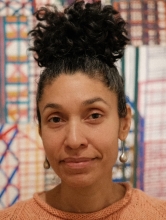
Mariatere Tapias is an arts-based teacher and educational researcher. Born and raised in Brooklyn, New York, she is a doctoral candidate in the Urban Education program at the Graduate Center, City University of New York. At a young age, she picked up needles and thread to imagine and give shape to her world. Sewing was how mami made a living, and her grandmother Amá, made patchwork blankets to develop new ideas. In her family, textile work was more than a product centered art form but a practice of being in dialogue, community, inquiry, and care. Stitching was a process of looking back to critically examine and carry the knowledge of their ancestors forward, along with new findings, questions, and methods. Over time, she understood that each finished project was never an ending but an invitation towards something new, unexpected, and not yet fully visible. Mariatere brings this range of perspectives and practices to her research, as a methodology that facilitates new forms of embodiment, leaning into uncertainty, and critical consciousness in her scholarship.
With over twenty years of experience teaching textile arts as a social and contemplative practice, Mariatere has worked in a variety of New York City environments: as an early childhood teacher, in youth and adult workshop settings, and most recently at an Older Adult Center. As the founder of the Slow Textiles Art Collective, she asks: Who are we engaged in radical imagination with? What healing practices are we nurturing? Where do we carry laughter and love? How do we undo, mend, and make what we imagine? In 2021, Mariatere became a founding member of the restorative / transformative justice group in the Urban Education program at the Graduate Center. With a commitment to community healing and engagement, she volunteers as a circle keeper with the New York Peace Institute. She turns to the land and ancestors to shape her sense of hope and direction.
Mariatere’s dissertation explores how artmaking as scholarship supports inclusivity, justice, and wellbeing in teaching and learning. In response to the harm caused by a positivist worldview that, all too often, reduces people to "objects of study," she centers collaborative seeing and making as a methodological response to the extractive nature of research. Through an emergent and participatory framework, she examines four themes: listening and collective agency, erasure and inclusionary justice, educational research as a practice of freedom, and student thriving. Her scholarship combines autoethnography, playwriting, and artmaking as paths for contemplation and transformative action in and outside of the academy. Bridging the divide between art and science, her project weaves together multiple worldviews to explore the generative possibilities of radical imagining.
In her opening chapter, Mariatere creates map-poems to illustrate how artmaking can help us document injustice and increase methodological transparency in our work as researchers. In chapter 2, she examines the arpilleras (tapestries) in the digital archive at the Museum of Memory and Human Rights in Chile to investigate the consequences of institutional erasure. Then, through a one-act play, she participates in archival repair and the recovery of stories. In chapter 3, three paintings serve as heuristics to examine how artmaking contributes to educational research as a practice of freedom and wellbeing. In chapter 4, she centers BIPOC (Black, Indigenous, and people of color) college students’ experiences in a reimagined research methods classroom, and how their perspectives regarding what a thriving learning environment looks, sounds, and feels like evolves over the course of a semester. Finally, in her closing chapter, she examines the transformative outcomes of artmaking as scholarship.
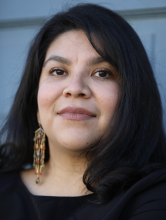
Martha Ortega Mendoza is a Ph.D. Candidate in the Berkeley Graduate School of Education. Stemming from her own experiences navigating the beginning of her graduate education as an undocumented student, her dissertation seeks to uplift the academic, social, and financial experiences of undocumented Latinx/a/o/ graduate students attending the University of California. Through her research, Martha seeks to understand how institutions can attract, retain, and graduate undocumented graduate students. Martha’s doctoral work has been made possible by different research centers at the University of California, (UC Berkeley) including the Center for Race and Gender, Greater Good Science Center, and the Institute for the Study of Societal Issues. Martha holds a master’s degree in education from UC Berkeley and a bachelor’s degree in Latin American & Latino Studies from UC Santa Cruz. In her spare time, Martha loves visiting new restaurants and sharing meals with her husband.
Within the undocumented student literature, we have limited insights into the trajectories of undocumented graduate students. To date, only a handful of studies have examined the experiences of undocumented students enrolled in professional programs, including law school (Escudero et al., 2019; Freeman & Valdivia, 2021; Kennedy, 2014; Lee, 2020; Olivas, 2020). Similarly, only a few studies have examined the experiences of students enrolled in research-focused doctoral programs (Lara, 2014; Lara & Nava, 2018; Landgrave, 2021; Montiel et al., 2020). Collectively, these studies have been pivotal in furthering the undocumented student scholarship. However, it is noteworthy to highlight that some of these studies have not interviewed undocumented graduate students directly (Escudero et al., 2019; Lara, 2014; Lara & Nava, 2018; Montiel et al., 2020).
To fill in this critical gap in the literature, my dissertation centers on the voices and experiences of undocumented graduate students through the use and analysis of students’ testimonios. Specifically, it draws upon 44 testimonio interviews with 22 undocumented graduate students enrolled in one of the 10 University of California (UC) campuses. By doing so, this dissertation examines the educational experiences and trajectories of undocumented graduate students enrolled in professional and doctoral research-focused programs within the (UC) system and how they are shaped by their field of study, campus, and ever-shifting immigration statuses. I further analyze how the UC system’s commitments toward its undocumented student population have been operationalized and examine the commitments that remain unfulfilled. While the undocumented student college population is remarkably diverse in terms of ethnic backgrounds (Teranishi et al., 2015), this dissertation focuses on a specific subpopulation within the broader undocumented student community — undocumented Latinx/a/o graduate students within the UC system. Here, I use the Latinx/a/o terms interchangeably to refer to individuals who are foreign-born and who have ancestry to a Spanish-speaking Latin American country in Central and South America, and the Caribbean (García Bedolla, & Hosam, 2021).
To examine the complicated and shifting landscape that undocumented graduate students experience within the UC system, my dissertation draws upon “liminal legality” (Menjívar, 2006). Liminal legality (Menjívar, 2006) allows scholars to move beyond antiquated black-and-white conceptualizations of immigration status that once rendered individuals strictly either documented or undocumented. Liminal legality has been used to examine how federal-level policies have granted individuals an in-between immigration status (Cebulko, 2014; Hamilton et al., 2020; Morales Hernandez, & Enriquez, 2021; Roth, 2019). I extend liminal legality (Menjívar, 2006) to examine the role of federal, state, and institutional level policies.
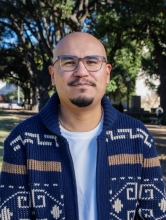
Gabriel Rodríguez Lemus, Jr. (he/él) is a 4th year Ph.D. student in the Program in Higher Education Leadership & Policy (PHELP) at The University of Texas at Austin with a dual graduate portfolio in Women & Gender Studies with a specialization in LGBTQ+ Studies and Mexican American & Latinx/a/o Studies. He is the son of Gabriel Rodríguez López and Rosario Lemus Quezada, who immigrated to Fresno, California, from Nueva Italia, Michoacán, México. Born and raised in Fresno, California, he has also lived in San José, California; Tucson, Arizona; Indianapolis, Indiana; and currently resides in Austin, Texas. He earned his M.S.Ed. in Higher Education & Student Affairs from Indiana University Bloomington and his B.A. in Sociology, with a concentration in Community Change from San José State University. Currently, he is a Graduate Research Assistant (GRA) for Dr. Alison Kafer, College of Liberal Arts, GRA for Project LEAPS (Latinx Education After Public Schools), and the Graduate Conference Coordinator for the Department of Women's, Gender and Sexuality Studies, College of Liberal Arts.
Gabriel’s contributions, scholarship, and service have earned him state and national recognition by receiving the 2023 Tracy Davis Emerging Research Award, Coalition on Men & Masculinities from ACPA; the 2023 AAHHE Best Scholarly Paper by the Association of Hispanics in Higher Education (AAHHE); selected as 2022 Graduate Fellow by the Texas Association of Chicanos in Higher Education (TACHE); a 2022 BIPOC Scholar by the Point Foundation; an 2021 & 2023 HSF Scholar by the Hispanic Scholarship Fund; and a 2021 Chancellor’s Doctoral Incentive Program Fellow by The California State University. He currently serves as Consulting Editor for the newly formed Journal of Queer and Trans Studies in Education and as an Editorial Board Member for Research in Brief for the Journal of College Student Development. Moreover, he was appointed to be the Social Media Coordinator & Webmaster for SIG 168 Graduate and Postdoctoral Education Across Disciplines for the American Educational Research Association (AERA). At UT Austin, he is the Founder and Co-Executive Director of the LatinX Graduate Student Association.
His academic research focuses on four main areas: (1) Men & Masculinities of Color, specifically Queer & Trans Latinx/o Masculinities & Disabilities, (2) Latinx/a/o People in Higher Education, (3) Critical Disability Studies in Higher Education, and (4) Qualitative Research Methods, specifically Arts-Based & Visual Methodologies. As an interdisciplinary educational scholar, his work lives at the intersections of Higher Education, Jotería Studies, Chicanx & Latinx Studies, and Critical Disability Studies. His dissertation work engages, complicates, & interrogates the ways Latinx/o masculinities are understood, specifically for queer & trans Latinx/o collegians living with disabilities. He will be conducting an arts-based participatory action research study for his dissertation. He will be organizing an arts-based collective that elicits art, poems, and photography at a Hispanic-Serving Institution. As a photographer and poet, he believes in the power of using art in higher education research, specifically bringing the various forms of knowledge production of queer & trans Latinx/a/o people into the academy. Ultimately, as a queer jotx first-generation Latinx doctoral student who lives with a disability, his work is deeply tied to his positionality.
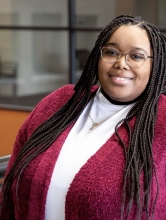
Janella D. Benson is a Ph.D. student in the Department of Educational Leadership & Policy Analysis at the University of Wisconsin-Madison. She is from the Eastside of Detroit, MI. She has over 10 years of experience working with students in secondary and postsecondary environments on easing their transition to and through postsecondary education. Janella holds an MA in Higher Education/Student Affairs from Eastern Michigan University, and a BA in Communication Studies and Political Science from the University of Michigan, Ann Arbor. Prior to her doctoral studies, she worked as a College Advisor within high schools in Detroit helping students prepare and navigate the college application process. She also worked with adjudicated youth on developing psychosocial and interpersonal skills that aided in their transition from a carceral setting through secondary attainment and postsecondary access. Finally, she worked in postsecondary transition programs supporting historically minoritized students navigating the transition into college through graduate education attainment. Her personal and professional experiences are deeply intertwined in her research. Janella’s dissertation explores Black women’s transition processes and the ways in which bridge programs influence their transition to and navigation through college during various socio-historical contexts.
Her research agenda draw from sociological frameworks and uses qualitative methodologies to (1) explore Black women’s transition through higher education programs to the professoriate and (2) examine the positive racialized experiences of Black women in higher education. Guided by this line of inquiry, her research will empower Black women to develop a legacy of fulfillment as they navigate to and through higher education.
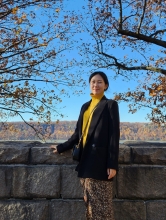
Hayejin Kim is a Ph.D. candidate in Research in Occupational Therapy at New York University. She holds her MA in Occupational Therapy from the University of Southern California and her BHS in Occupational Therapy from Hanseo University, South Korea. Her research interests focus on accessible community-based rehabilitation programs that integrate technology to support individuals with stroke. Under the guidance of Dr. Grace Kim, she is currently working on her dissertation project aimed at investigating the key factors influencing patient engagement in videoconferencing-based telehealth among community-dwelling individuals with stroke. Prior to her Ph.D. studies, she worked as an occupational therapist in an inpatient rehabilitation hospital in South Korea, where she specialized in rehabilitating patients with neurological conditions.
Her research interests stem from her clinical work with individuals with stroke, where she frequently observed their struggles in transitioning back to their homes. Many faced barriers due to the lack of adequate rehabilitation services in their communities, leaving them confined to hospital settings long after the acute phase of their recovery. Witnessing the gap in community-based rehabilitation services, which are critical for reintegration into society, fueled her resolve to empower patients to regain independence and reintegrate into their communities, driving her towards research.
Seeking to enhance her expertise in research on community-based rehabilitation, she pursued further study in this area during her Ph.D. Under the guidance of Dr. Grace Kim, she has centered her research on the integration of mobile technology in stroke rehabilitation. Her work as the lead author in a study exploring mobile technology use among individuals with stroke unveiled their positive attitudes towards the use of technology in home-based exercise. In collaboration with Dr. Grace Kim, she also examined the impact of the COVID-19 pandemic on individuals with acquired brain injuries. Their work highlighted the potential of telehealth as a viable and accessible rehabilitation service, particularly due to its ability to overcome geographical barriers and enhance accessibility, especially in rural areas. However, their investigations also shed light on disparities in patient engagement in telehealth.
Her dissertation, “Examining Key Factors Influencing Engagement in Videoconferencing-Based Telehealth in Individuals with Stroke” aims to thoroughly understand patient engagement in telehealth to make it a reliable and accessible service. This, in turn, will bridge the gap between the demand for continuous rehabilitation and the challenges faced by individuals with stroke in accessing in-person services. As she looks to the future, she aspires to be an independent researcher making substantial contributions to the development of inclusive and effective community-based stroke rehabilitation.
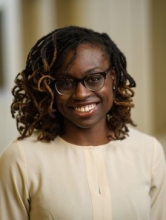
Deaweh Benson is currently a doctoral student in the Developmental Psychology program at the University of Michigan. She investigates racism, health, and healing with a focus on Black adolescents and young adults who experience intersecting marginalized identities (e.g., race, class, gender). Her work is grounded in cultural-ecological frameworks, Black feminist theory, critical consciousness, and positive youth development. Deaweh earned her Bachelor of Arts degree from Spelman College and her Master of Education from the Harvard Graduate School of Education. She has worked in non-profits, research organizations, and academic institutions where she has examined socioemotional development, college student academic success, and the economic security of young adults.
Deaweh’s work broadly pursues three lines of research: (1) Examining the potential neurobiological embedding of structural racism (i.e., brain function and structure), (2) Investigating factors that protect youth from racism exposure (e.g., ethnic-racial identity, critical consciousness, and social support), and (3) Identifying opportunities for healing and transformation despite exposure to structural racism. Her current dissertation entitled, “Development in the Context of Racism: An Exploration of Health Risk and Resilience Among Black Adolescents and Young Adults,” includes three empirical investigations examining how individual-level racism (e.g., racial discrimination) and structural racism (e.g., deadly gun violence, police contact) relate to a range of health outcomes including amygdala function, anxiety, and depression. In this work, Deaweh assesses whether broad sources of social support received from family, peers, romantic partners, and mentors promote resilience despite racism exposure. She also tests whether poverty further compounds disadvantage and constrains opportunities to demonstrate resilience.
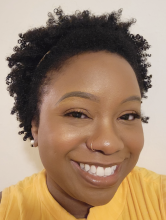
Kimberly Williams is a doctoral candidate in the English Department at the University of Florida where her work encompasses Blackness, rhetoric, and sound studies across multimedia and literature. She previously graduated from Virginia Tech (B.S.) and Cornell University (M.F.A.) and claims Virginia as her home. She held previous fellowships with the National Humanities Council, Callaloo Oxford Residency, the Sweetland Digital Rhetoric Collaborative, Crisner Museum Fellowship, and the Association for African American Museum Fellowship. You can find her works in Sounding Out! Journal of the Society for American Music, Peitho, Constellations: A Cultural Rhetorics Publishing Space, and more recently Global Black Feminisms: Cross Border Collaboration through an Ethics of Care published by Routledge. She has been awarded the 2022 Ruth McQuown Justice Scholarship, 2019 Virginia Tech Black Excellence Black Student Ally Award and the 2018 Virginia Tech’s Ed McPherson Lifetime Achievement Award for Social Activism & Change.
My research concerns Blackness, sound studies, and rhetoric or more specifically--I study how Black people create sonic testimonies through embodiment, literature, and multimedia studies. In my dissertation, I research how Black communities developed sonic practices across multiple disciplines during the COVID-19 quarantine and simultaneous Black Lives Matter Movement efforts. These examples include the Verzuz battles, Zong digital memorial, and sonic responses to "wokeness."
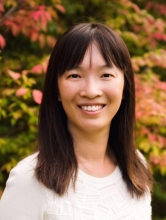
Yi-jung Wu is a PhD candidate in Educational Leadership and Policy Analysis, with a doctoral minor in Educational Psychology. Before starting her doctoral studies, she worked as a research assistant, responsible for educational and psychological research projects, and as a middle school mathematics teacher. She is working on her dissertation, "Distributed Leadership Practices According to the Comprehensive Assessment of Leadership for Learning (CALL) in Taiwan’s Elementary Schools." Her research interests include Comparative Educational Administration, Gender Inequality in STEM (Science, Technology, Engineering, and Mathematics) Education and Careers, Stratification and Social Mobility, Diversity, Equity, and Inclusion (DEI), International Students, Asian Immigrant Youths, Well-Being, and Mixed/Multi-Methods. Yi-jung holds a B.S. in Mathematics from National Cheng Kung University, Taiwan, and an M.A. in Educational Leadership from the University of Manchester, UK.
